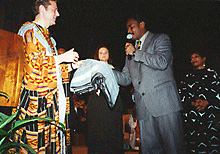|
|
|
|
|
|
|
 |
|
|
Dr. Hippalyt Pul (right) presents Father Michael Pfleger with
a stole from Ghana as “thank you” for support of an African clinic.
Photo by Michael D. Wamble |
|
Parish partner in African AIDS clinic
By Michael D. Wamble
STAFF WRITER
“We have been looking for this type of partnership ... to help
transform the way people look at the world and help their understanding
of the realities of Africa,” said Dr. Hippalyt Pul, a program
director for Catholic Relief Services (CRS) in Ghana at St. Sabina
Parish Feb. 11.
The parish has begun a relationship with a medical clinic in Ghana
to combat AIDS.
The predominantly African-American parish donated $15,000 to establish
an anonymous HIV-testing center in Tamale, Ghana at a Feb. 11
Mass celebrating Black History Month.
Upon presenting the check, St. Sabina pastor Father Michael Pfleger
stated that this is just the beginning of their partnership.
“We are not only going to build the center, but we intend to send
nurses, doctors and social workers from this church to volunteer
at the clinic so that it may become all that it can be in Northern
Ghana,” said Pfleger.
The link between the parish and the clinic was assisted by James
Lund, CRS major gift officer, and Elena Segura from the Chicago
archdiocesan Office for Peace and Justice, who coordinates local
CRS efforts.
Officially only 3 percent of the adult population of Ghana have
been diagnosed as HIV-positive, but according to Pul, the actual
percentage is much higher.
The problem said Pul is that the fear that stems from the “social
stigma” of publicly being HIV-positive significantly lowers the
rate in which people are tested.
“Until 1995, the HIV-positive rate was zero because there was
zero awareness and no testing,” he said. “But as people began
to be tested, the rate jumped 300 percent. That means a lot of
cases hadn’t and still haven’t been discovered.”
The hope is that the center’s anonymity will promote testing.
“Here the sampling point will be different from the testing point,
and therefore no one in the chain will be able to connect the
result to a person,” said Pul of the Shekhinah Clinic. Shekhinah
is a Hebrew word meaning “presence of God.”
Since 1991, the clinic, founded by Dr. David Abdulai, has served
as a medical site and a residence for poverty-stricken patients
and their families with nowhere else to live.
Lund, who visited the clinic last June, said that not all of the
clinic residents are HIV-positive. Some suffer from tuberculosis
and additional maladies. Others need time to recover from surgeries.
Pul informed the congregation that the facility will be called
the St. Sabina Laboratory Center.
The partnership between the parish and the clinic, said Segura,
is “unusual” in nature.
Of this project, Pul is optimistic about the partnership, saying,
“I hope, as Father [Pfleger] said, it is only a sign of things
to come.”
Front Page | Digest | Cardinal | Interview
Classifieds | About Us | Write Us | Subscribe | Advertise
Archive | Catholic Sites | New World Publications | Católico | Directory | Site Map
|





